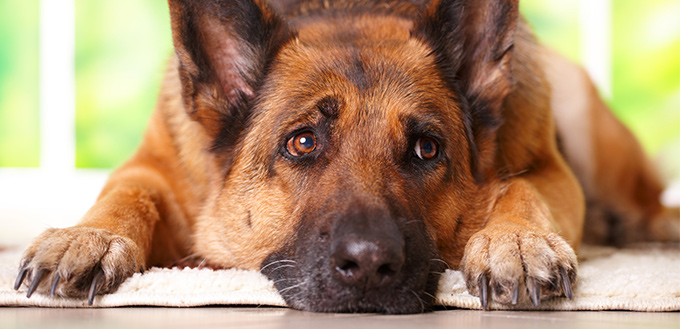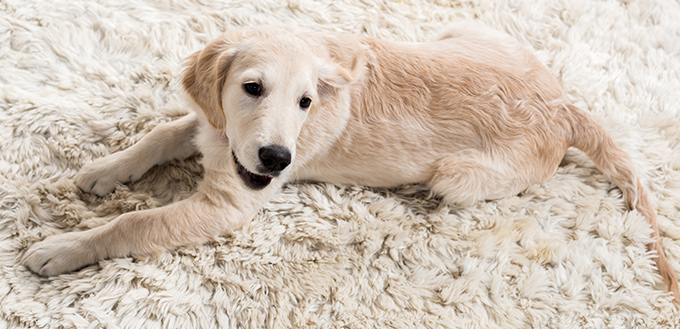We all expect dogs to lick things sometimes, they lick us to show affection, they lick up crumbs or spillages from the floor and sometimes they even lick walls and furniture. But when does licking stop being cute and amusing and become a problem?
Making sure that your floors and surfaces are clean and that food and drink isn’t spilled will give dogs less reason to lick things that they shouldn’t be licking.
As soon as you notice any unusual behaviour in your dog (and you know your dog best), seek advice from your vet.

Excessive Licking of Surfaces (ELS)
Excessive Licking of Surfaces (ELS), is a condition suffered by some dogs. It is not just a random occurrence, it is a pattern of excessive behaviour that involves licking floors, walls, furniture and carpets and can be a result of or lead to serious stomach and gastrointestinal issues.
Research carried out at the Montréal Veterinary Teaching Hospital in the mid 2000s by V. Bécuwe, M-C. Bélanger, D. Frank, J Parent and P. Hélie on 29 dogs showed that 19 of them had ELS. Some of the dogs were only licking things after meals at home, suggesting that there was something in their diet or in their reaction to food that was making them act in this way. However, 90 days after treatment for stomach issues, 10 of the dogs showed a substantial reduction in their obsessive licking practices and eventually nine of the dogs were completely cured of an Excessive Licking of Surfaces behaviours.
As well as Excessive Licking of Surfaces, there are two other major reasons why dogs might engage in obsessive licking of their surroundings, both are treatable, but will require a lot of input from owners.
Boredom
Is your dog lacking physical and/or mental stimulation? Classic signs of boredom, along with licking carpets and anything else in sight are:
- Destructive behaviour – Tearing stuff, scratching things, simply pulling things apart because there is nothing else to do.
- Digging – If your dog is digging in the garden he is immediately rewarding himself with whatever he manages to uncover, as well as burning off excess energy.
- Chasing his tail – Burning off more energy by running round and round.
- Barking – Does your dog bark at you, other dogs, the wind blowing? He’s looking for attention.
- Listless – Perhaps your dog has just decided that there’s no point trying to get your attention, so he simply lies about all day, not bothering with anyone or anything.
- Biting – If your dog is nipping at your clothes or your heals he’s looking for your attention.
- Whining and whimpering – Another attention seeking strategy
- Nipping other dogs – Again trying to catch the attention of someone else.
- Getting in your face – If your dog is jumping onto your lap, getting his face close to your and staring intently into your eyes, he’s trying to make you notice him.
- Pacing – Constantly pacing the room, looking for something to do and to burn off some unused energy.
Treatment for Boredom
- Aim to take your dog for two walks a day, and add some play by taking a ball or a dog frisbee with you so that your dog can get some fresh air, burn off some energy and also keep fit.
- Make time to play with your dog, encouraging him to interact with you and get some exercise.
- Buy some dog puzzle toys, either those that give out treats by being rolled around, or when something is lifted or pushed; or the sort that do something when they are played with in the right way. These will keep your dog challenged and thinking. Have a range of toys, so that you can swap them around regularly so that your dog doesn’t get bored.
- If you have to be out at work all day, consider employing a dog sitter or walking service, or look into sending your dog to doggie day care so that he is interacting with other humans and dogs and is getting plenty of exercise and stimulation.
You May Also Like: Dog Treats

Stress
Stress might be brought on by a number of situations, but moving home or introducing a new family member or pet to your house could be contributing factors. In these situations, try and keep your dog’s familiar belongings around him and maintain his usual routine. Take him out for walks in the new area and give him time to get acclimatised to the new situation.
Signs That Your Dog Is Stressed
- Digestive issues – Diarrhoea, constipation, gastrointestinal problems, carpet/furniture licking
- Decrease in appetite – A sudden and dramatic loss of interest in his usual food should be a concern (if it’s a new food for him, he may just not like it).
- Isolating himself – Does your dog regularly take himself away into a quiet corner, possible behind something and facing the wall)? All dogs look for a bit of quiet sometimes, but if your dog seems to be doing it more than is usual then you should be concerned.
- Increased sleeping – Actual sleep. or pretending to be asleep, particularly at unusual times for your dog.
- Aggression – Trying to bite you, other people and other dogs, again particularly if your dog had previously been happy around people and dogs.
Treatment
- Make sure your dog is getting plenty of play and exercise. For safety’s sake you may want to consider a muzzle when your dog is out in public, or you may chose to take him to quieter places to walk and play and gradually re-introduce him to busier environments.
- Create a “safe zone” in your house, somewhere quiet and comfortable that your dog can take himself off to when things are getting a bit too hectic for him in the normal environment.
- Ensure that your dog is eating a good, high quality diet. You may want to seek advice from your vet or an animal nutritionist as your dog may benefit from fresh, organic, high quality meals rather than traditional dog foods.
You May Also Like: Organic Dog Food
In all cases with unusual behavior from your dog, seek advice from your vet so that medical and psychological conditions can be investigated and treated as soon as possible.
Related Post: Best Dog Muzzle
Sources:
- Dr. Wailani Sung, Why Do Dogs Lick Everything?, PetMD






